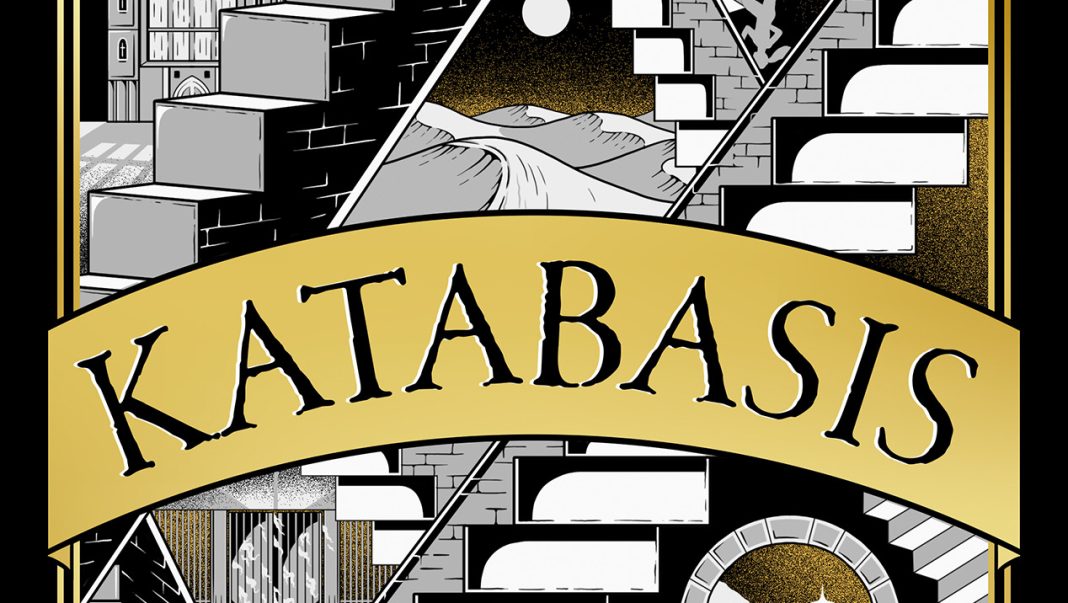R.F. Kuang’s Katabasis touches on a range of near-universal academic experiences: impostor syndrome; frantic, caffeine-fuelled study sessions; watching someone effortlessly ace every single test you suffer through; and, of course, accidentally sending a professor to the depths of Hades. For the novel’s protagonist, Alice Law, all of these experiences are just a string of inconveniences standing between her and completing her PhD.
Alice is a student of “Analytic Magick” at the University of Cambridge under the supervisor Jacob Grimes. Readers will benefit from having some familiarity with logical puzzles, because, in Katabasis, this ‘magick’ involves harnessing the power of philosophical paradoxes with chalk pentagrams to achieve the impossible. Manipulating the ambiguity of Sorites Heap can produce a flask that never runs out of water, for instance, whilst a pentagram invoking the Achilles Paradox can fix an unsuspecting victim to the spot. It is in the disastrous aftermath of one of these pentagrams gone wrong that the novel opens, a small error in the chalk outlines having had fatal consequences for Grimes.
As a magician, Alice is familiar not only with philosophical problems, but with the many stories from sojourners who have trekked through the underworld and returned. Armed with piles of research from the university archives, Alice decides to set off to retrieve her professor’s soul before he – and his ability to sign off on her work – are lost forever. What she does not count on is the fact that her fellow PhD student and greatest academic rival, Peter Murdoch, will be along for the ride. From there the narrative unfurls, switching between Alice and Peter’s journey through hell and flashbacks to their time at Cambridge, with hints at something much darker than scholarly ambition underlying their hell-bound journey.
The story twists and turns in unexpected ways, with no character able to evade their complicity in the toxicity of Cambridge’s elite environment. Kuang herself studied at both the University of Cambridge and Oxford – the latter of which was heavily critiqued for its role in colonialism throughout Kuang’s 2022 novel Babel, or the Necessity of Violence. Current Oxford students will be pleased to know that just as Babel held nothing back in its unflattering depiction of 1830s Oxford, Kuang also pulls no punches in her depiction of 1980s Cambridge.
However, where Babel focused on discrimination on a systemic level, Katabasis gets personal: Alice’s life at Cambridge is a horror story of the nepotism, prejudice, and sheer misfortune that mark academia, implied through the personal relationships (or lack thereof) that have shaped her experiences as a PhD student. As she reflects on Grimes’ tutelage, Kuang gradually unfurls the web of fear, adoration, and dependence that has come to surround her relationship with the supervisor, to the point where following the professor to hell seems to Alice, perversely, like the most logical course of action.
The very system of magick Kuang weaves for her latest novel becomes an allegory for the hopelessness of academic life. The text gives brief but dense explanations of how these enchantments work, and how linguistically complicated pentagrams factor in. For an ambitious author who seems to desire equally ambitious readers, the intellectual challenge of Katabasis is not an inherent disadvantage, but the story definitely does not hold the reader’s hand.
Readers can either attempt to dive deep into the nuances of each enchantment and understand how they function, or they can simply trust in Kuang’s highly original fantasy fabrication, and live in blissful ignorance of its philosophical detail. The key point in the story is that the basis of all magick is belief regardless of truth; without unjustified overconfidence that your spells will work, they will certainly fail. Thus, as Alice summarises with grim satisfaction, in Katabasis’ fantastical world: “You could do anything if you were delusional enough.”
This capacity for fooling herself comes in handy for Alice both when inscribing pentagrams, and trying to convince herself that academia is a meritocracy. The parallel between the hellish, essentially illusory nature of both magick, and academia, is one that Kuang emphasises repeatedly throughout the novel. Early in their journey, for example, Alice and Peter traipse through hell’s court of Pride, where library-dwelling souls are taunted by never-ending reading lists and ambiguously-phrased assignments – experiences that unsubtly parallel those of the two PhD students. Kuang’s laser-focus on the toxicity of academia is a particular strength of the novel, with Katabasis’ deconstruction of the tendency to glorify the mind at the expense of physical and mental health one of its most well-executed themes.
Despite the focus on elite academic environments, Katabasis never becomes overly alien to those outside of these institutions. For, although the complexity of Katabasis’ fantastical elements will likely distance any reader who lacks a philosophy degree from the minute details of the tale, the overarching message remains accessible: the novel promotes, above all, the importance of self-care and self-assurance. Salvation is achievable when characters trust their own abilities, rather than seeking endless validation, a sentiment that even those without personal experience in the many horrors of the underworld (or academia) can take inspiration from.
Katabasis is a bold work which manages to explore powerful questions of life, death, and logic, alongside painful personal realities. Once again, Kuang draws from her own experiences to scrutinise the joys and terrors of world-leading institutions, mixing in a highly original magic system to drive her points home with a blend of dark humour and unflinching emotional honesty. While laden with philosophical paradoxes ranging from the ancient to the modern, the story keeps the reader engaged with its pace, action, and humour, which all produce a propulsive, insatiable need to know what happens next.


